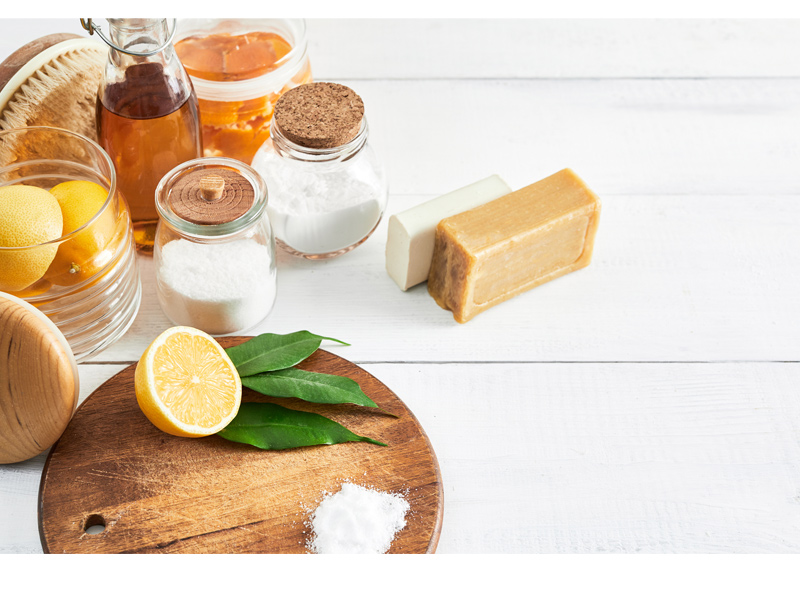Live greener: how and why you should ditch the toxic stuff
By switching out nasty chemicals for green alternatives at home, you can improve not only the planet’s health, but maybe even your own. Here’s how to do it.
If you’re looking for ways to lessen your impact on the environment, but don’t know where to begin, here’s a tip.
Swap some common toxic household products for eco-friendly alternatives – it’s a simple way to get started.
Sustainability educator and eco business coach Laura Trotta says what we consume and how we live our day-to-day lives matters.
“It matters to our own health and to the health of our planet,” Laura says.
- Clean up your act: 5 habits that are good for you and the planet
Why choose eco-friendly products?
Australians produce 540kg of household waste per person every year.
And each year about 130,000 tonnes of our plastics end up in the waterways and oceans.
Meanwhile, the chemicals commonly found in household products are not only damaging to the environment, including marine and wildlife, they can be harmful to your own health.
By choosing plant-based, non-toxic formulas in minimal, biodegradable packaging, you can help prevent pollution, cut waste and reduce your exposure to toxic chemicals.
“Being eco-friendly is about making mindful choices in what you purchase and consume to reduce your impact on our environment and preserve our precious resources for future generations,” Laura says.
- Make your own: Your DIY guide to eco-friendly household cleaners
How to tell if a product is eco-friendly
Just because a product is marketed as “green” or “natural” doesn’t necessarily mean it’s eco-friendly.
The Green Hub founder Kira Simpson says the best way to understand the impact a product will have on the planet is to scrutinise the label.
She says, as a rule of thumb, the fewer ingredients the better.
“Household products often contain petrochemical solvents, ammonia, caustics, phosphates, bleach, SLS, and these ingredients don’t biodegrade – they’re washed down our drains where they end up in the environment,” she says.
- Clean beauty: Eco-friendly ways to nourish your skin
What to avoid in household products
Laura suggests being alert to these ingredients when choosing household products:
- Antibacterials: Chemicals such as triclosan can damage microbial ecosystems.
- Surfactants: Can accumulate at toxic levels in the environment.
- EDCs: Endocrine-disrupting chemicals such as pesticides, BPA, phthalate, parabens and perfluorochemicals in cleaning agents, glues and paints can interfere with the way the body’s hormones work.
- Fragrances: Can be a cocktail of hundreds of chemicals.
You should also pay attention to packaging and the brand’s overall sustainability, Laura says.
“Avoid products that use single-use plastics or are not concentrated, and consider if the brand gives back to social or environmental causes that make a bigger impact,” she says.
Try these eco-friendly household alternatives
Your pantry is probably already loaded with ingredients that work just as well for cleaning as chemical-based alternatives, according to Laura.
She says white-wine vinegar, for example, can replace most window, bathroom and kitchen cleaners.
“White vinegar is a popular home cleaner and for good reason – it’s widely available, economical and safe to use around the home,” she says.
Just dilute it with water and add essential oil to make an all-purpose cleaner.
Here are some more common household products to consider using for cleaning:
- Bi-carb soda: Add water and use to clean sinks, toilets, baths, ovens, fridges and surfaces.
- Lemon: Helps fight bacteria and remove stains.
- Soap flakes: Use as laundry detergent, hand soap and floor cleaner.
- Olive oil: Makes for an excellent furniture polish.
- Essential oils: Naturally anti-bacterial; use to sanitise and fragrance the home.
Go easy on the planet, room by room
In the kitchen
Ditch: Greaseproof paper, paper towels and plastic sponges, storage containers and wrap.
Use: Reusable baking mats, microfibre cloths, cellulose sponges, reusable storage bags, reusable straws and water bottles, glass containers and beeswax wraps.
In the bathroom
Ditch: Plastic toothbrushes, plastic dental floss, disposable razors, over-packaged beauty products, make-up wipes and synthetic loofahs.
Use: Bamboo toothbrushes, biodegradable floss, stainless-steel safety razors, no-packaging beauty products, shampoo bars, tree-free toilet paper, reusable wipes and real loofahs.
In the laundry
Ditch: Chemical-laden washing powders, softeners and dryer sheets.
Use: Castile soap, borax and washing soda to wash, vinegar to deodorise, baking soda to brighten, essential oils for fragrance, and wool dryer balls.
- Microplastics: How to reduce them in your home
Written by Dimity Barber.






